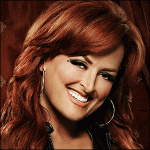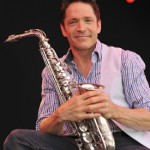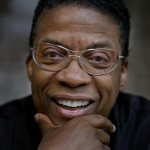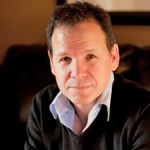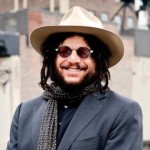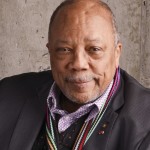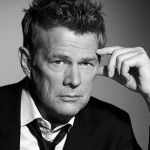We’re told as kids that manners cost nothing and upon his arrival Nathan East greets me with the broadest grin in music, bar none, “thanks for hanging around and waiting to talk”. This is a bassist who has truly seen it all, done it all and worn the t-shirt many times. Hey, he played at Live Aid and has performed for three American presidents, nevertheless he comes across as the coolest, nicest and most modest of players. It’s no surprise how he remains the first call bassist for so many artists and producers. It’s not just the chops, being a nice guy makes the job twice as easy.
The past few months have been a whirlwind with clinic dates across the globe, tour dates with Fourplay, Clapton and the release of his debut solo album. But this is nothing new for the session ace, 2013 was far from a quiet year either. Touring with Toto and the small matter of recording parts for Daft Punk’s ‘Random Access Memories’ return to form album which featured the most popular, not to mention the most danced to, song worldwide of the past eighteen months. How did that opportunity come to pass? The infectious East grin prefaces his response. “It was a new adventure and you never could have predicted that single would be so big. It came right out of the blue, they came directly to me. I had just watched the ‘Tron Legacy’ movie, they wrote the soundtrack so were on my radar, the next thing I’m in the studio with them. The first time I heard ‘Get Lucky’, you’re going ‘wow, love this’, but you just don’t know how big it might be. They play 45,000 seat venues but then after the show, they walk home with the crowd and no-one knows who they are.”
Like so many American bassists, The Beatles appearance on The Ed Sullivan Show in 1964 made a significant impression on the then young Nathan, as he describes. “The Beatles are on Ed Sullivan and I’m there with a broomstick holding it like a guitar, I knew I wanted to play something. The Beatles were huge, I thought ‘okay, that’s what I want to do, that’s cool’, who wouldn’t want to play music? But back in the day, those groups sealed the deal. My brothers were my first incentive, I copied my older brother David, he became a pilot, I wanted to be a pilot. He played guitar but I couldn’t get my hands around the chords. Then there was a bass, it was a miracle, I felt instantly at home on it and the next day they said I was going to be the bass player in the band.”
As with so many bassists, the ‘first bass’ story is a humble affair but from small acorns….“My mum took me down to the pawn shop and bought me my first bass for $49…see you later! I still remember the smell of the case it came in! Then in 1971, she took me to Manny’s Music in New York, The Beatles had been there, and she bought me a proper Fender Jazz Bass for $210, the smell of the bass and the case was intoxicating, the big F plate, the pickup covers, that logo was a huge inspiration!”
Despite having a monster reputation for his bass playing alone, Nathan is no slouch in the vocal department either, regularly applying his vocal prowess to most projects he gets involved with. This is no accident and simply adds an additional string to his bow when being considered for studio and live work alike. “I started from an early age, all gigs need vocals, it doesn’t matter if it’s Earth, Wind & Fire or The Spinners, someone has to get up there and sing. I always smile when I think of Phil Collins. Genesis needed a singer and he said ‘I’ll have a go’. In every band I work with, everyone gets a mic. It definitely lends itself to being asked to do big tours, you’re getting a ‘twofer’, two for the price of one, an extra utility singer. With Tessa (Niles) and Katie (Kissoon) on the Eric Clapton tours, we had a great time together and it was something we worked at, to a non-verbal understanding so I could gravitate to my note or key instinctively. When I started out, I learnt James Brown basslines by singing them first….’bum de bum de bum de budley bum’. When I was in club bands, I wanted to be George Benson on the bass, I found his scatting inspirational, as a guitar player he was second to none, then he would open his mouth and sing and I’d be like…’really?’, his voice is like Donny Hathaway and Stevie Wonder combined and he can play the way he plays! He encouraged me to sing too, ‘if you can sing brother..come on!’”.
Barry White was the first name artist to call on Nathan’s playing skills at the tender age of 16. Not a bad teacher/taskmaster to have to learn the ropes of how to play in a band and touring the country as Nathan recollects. “He didn’t go as far as to fine you but he would fire you! I remember one time in the studio he got on the mic and said ‘the next motherfucker that makes a mistake is fired!’. You literally had musicians with sweat coming out of their palms, he was this big huge guy, he used to carry a 357 Magnum into the studio, lay it on the console, you’d look up and think ‘wow, okay…’, straight out of the ghetto. I went to BWU, Barry White University, he used to craft some of the most amazing basslines, he’d sing your part to you, he had two bass players in the band, ‘Nate, play this…boom….boom, boom…’, and the other guy would play ‘deooow…..’, like a high snap and slide and you’d just lay on those parts all day long.”
As Nathan’s profile has grown, naturally artists and producers have increasingly approached him directly for his skills which is a satisfying position to be in as a musician as Nathan is quick to attest to. “The cool thing is when people come to you because they want you and I may not be available for two months out but they will wait for me. It’s better than what it used to be when I’d say, ‘I can’t make it, call Abe (Laboriel)…he’s busy…..well call Freddie (Washington)…he’s busy too…’ and they’ve gone through ten guys prior to you, but it’s nice when you get the call direct and I still get excited by that.” Playing with great artists means you also get to play with the top players on other instruments and having worked with some of the greatest drummers in recording music history, Nathan’s in an enviable position. “The top top guys, what they play is so correct first time out on the date but when you get a room full of guys who know what to do, there is no explanation required, it’s like ‘we’re there…’, it’s instant, you don’t have to play all day. For example, preparing for major tours with Eric (Clapton), we used to rehearse for a month which was sort of overkill, now we book a couple of weeks. I played with Eric in Japan last year and we hadn’t played for a while, and he put the band back together with me and Steve Gadd after having Steve Jordan and Willie Weeks. This was a bit of an experiment to see how we would do together and on day one he said ‘okay, you played the right things’. We had an easy rehearsal schedule from then because day one was so good. So we would play for a couple of hours a day and then he’d release us, ‘really?…..we’ve only done a few hours….it’s okay, I’m happy’ … so that’s when you know it’s fine. With Phil Collins, that band had toured a lot, he booked two weeks for rehearsal, the first day sounds like a gig so he says ‘what are we going to do for the rest of the two weeks?’. You just go through the motions at that point but people who’ve done their homework make it that easy.”
Being off his ‘A-game’ is never an option for Nathan, quality is everything which requires a high degree of concentration and with good reason. “I never go on autopilot for anything, not for anything! We used to talk about it, you have to make each tune sound like it’s the first time you played it and the last time you will ever play it. I’m down the middle, you have to relax to create a vibe but you also want to have the energy to make it sound like you may never get to play again, to dig down deep. Its kinda like a combination of you know it, eyes closed with your hands tied behind your back but also it’s as fresh as the first time you played it. In the studio, I love having the control of coming up with parts but I love collaborations as well. You may have a great idea, you don’t have to be a music scholar and I’m always open to options.”
Back in the mid-Eighties, Nathan produced several artists, including Gail Ann Dorsey (David Bowie’s bassist) but his role in the production hot-seat has been limited, interesting considering his studio-based reputation. Nathan explains his reasoning, “It’s a combination of being busy and producing means you’re locked into the studio all day and into the night for months at a time. As much as I love it, it’s not as rewarding as going out and performing live. I don’t enjoy sitting in a studio looking at gear all day, especially when the sun is shining outside, after a while it seems like there’s this big huge machine but it’s not giving me anything back. I like to go in the studio, get it done and go.”
Nathan has always been considered a tasteful player, foregoing bass histrionics for a more considered approach and almost economical in his playing technique yet his take on his own playing style isn’t that surprising. “The six-string gives you a bunch of notes in one position but who wants to work harder when you can work less and get more results but the six-string helps. Economy of position is what you aim for, ‘how many notes are available to me in any one position?’. I’m always adjusting my right hand, tone is so important to me. Every gig, every room I’m in, I’m always adjusting my tone for that room with the EQ on the bass and through my fingers. I used to be the same with pickups, my first Fender Bass had so many holes in it where I tried different pickups, I had to put a big wooden block in it to fill the holes, I was always looking for different tones with different pickups. I’m always adjusting every song I play, I just want it to be music that people can hear. When I was a young and upcoming musician, I read interviews of everyone, I’d read every word and think that’s what I had to do. Chuck Rainey, James Jamerson, Quincy Jones, people pay attention so you can’t lose sight of what you’re doing. It’s our job, doing it every day but people are sincerely trying to carve something out, there is always something to learn. I remember Chuck Rainey said once he grew his fingernails if he wanted a little more attack like a pick, so I did that.”
Talking to Nathan highlights just how appreciative he is for the career he has had so far yet he grasps the challenge to stay motivated and inspired very readily as though it’s no challenge whatsoever. “It’s never been hard to get motivated when you think about it, first of all, I’m living the dream, I’m not getting up to drive through rush hour traffic to do a job I hate so I never lose sight that this is something I love to do, it’s a privilege. The last time I saw Mike Rutherford (Genesis guitarist/bassist), he said ‘isn’t it great that we get to do this?’, there you have it in a nutshell! I feel sorry for people that can’t get inspired enough, most of the planet would give one of their limbs to do this. I was just in Japan and they roll out the red carpet there, what’s not to like, but some people can still find something to complain about.”
As a perennial user of Yamaha basses, it only seems to be the amps and cabs that ever change in the East arsenal and even then it takes a special amp to turn this man’s ear. Despite his prominent position, he still goes to stores, the same as the rest of us mere mortals. “I always have my eyes and ears open, always, I have to keep it at the top top standard so obviously if there’s something out there I don’t know about and I should, or if I’m on the road, I’ll go into a music store and if I see some gear or an amp, I plug in and that’s how I discovered Eden Amps. With TC Electronic, they found me. I was walking past a booth at a music show and I saw the TC Blacksmith amp head, it looked great, the first thing in my head was they got the right look for it, very cool. They sent a rig to my house and six months later, when I was getting ready to go on tour I dragged the rig out and performed a side by side test, a straight shoot-out with my previous Aguilar rig, I agonized over the decision for a few days but the TC rig became my rig of choice. Aguilar is still an amazing amp but there was some additional technology in the tc that I was attracted to. I do thorough homework with my amps, there’s no turning back once you’re on the road. I rely so much on the sound of my Yamaha basses, I can’t imagine changing. There are so many great instruments out there, some basses are so beautiful they look like furniture, the craftsmanship is amazing but it’s not the standard I’m used to sonically. Maybe my ears are tuned into my basses so acutely. I can pick up another brand of bass and it will sound good but it’s not that personal thing that I’m used to.”
Having played on early recordings for the likes of Whitney Houston and Madonna, Nathan was already part of their history before they became famous but it was clear that they would go far as he elaborates. “You were aware that the talent was there, Whitney sang like an angel and you hoped the record company knew what to do with this girl, but I’ve been in similar situations and then never heard of the artist again. Whitney was undeniable, if the label did their homework, she couldn’t fail. These days, any singer can go in, you don’t need to be able to sing, just use Pro Tools, use Autotune and Autocorrect. It’s a bit disheartening, back in the day the only reason for taking someone into the studio was to preserve their gift, their talent was so special it had to be recorded. The real test is If a singer can go into the studio with just her voice and a piano, there’s nothing to hide behind.”
Nathan’s bouncing bass-line for 1984’s Song Of The Year, ‘Footloose’, played a large part in the songs’ success but it was only recorded after the band toured the song for several months beforehand, a strange way to record a major release as he explains. “Kenny drove us nuts because every day we had to rehearse Footloose for months, every day you’re carving it out. When we eventually recorded it, it was the opposite of what I would usually do but audiences were reacting to it, the formula worked, a number one record. I came up with the bass line, tried everything under the sun but it was one of those deals where you’re doing it to amuse yourself, crazy but again, there must be something to that process because it went down first take. It was definitely played in! Nowadays, would that bass line be on there, maybe not but it became that because I was tired of playing it.” You can also hear Nathan’s bass lines on 1997’s Song Of The Year, ‘Change The World’ by Eric Clapton and 2013’s mega- hit and Song Of The Year, ‘Get Lucky’ by Daft Punk.
And there you have it folks in a nutshell, you can underplay, you can overplay or you can hit a home run straight down the middle but even the seasoned pros can’t define what will become a worldwide hit. With his new film ‘For The Record’ garnering rave reviews, it doesn’t sound like Nathan is going to put his feet up for some time yet but what does come across when you speak to him is that hard work, solid practice, being easy to work with and some good fortune along the way does pay off but always strive to be the best bassist that you can be.
